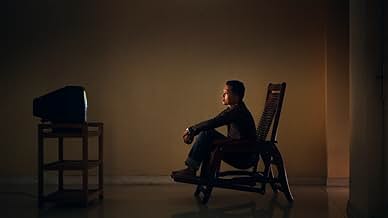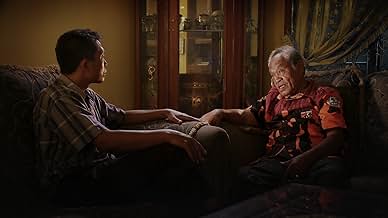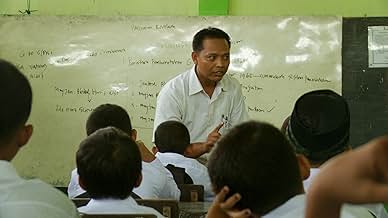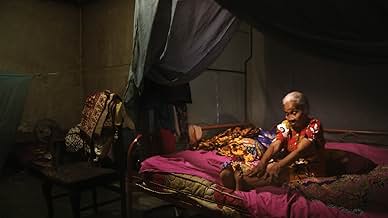Uma família sobrevivente do genocídio na Indonésia confronta os homens que mataram um dos seus irmãos.Uma família sobrevivente do genocídio na Indonésia confronta os homens que mataram um dos seus irmãos.Uma família sobrevivente do genocídio na Indonésia confronta os homens que mataram um dos seus irmãos.
- Indicado a 1 Oscar
- 48 vitórias e 45 indicações no total
- Self - Sprecher
- (narração)
- Self - former leader of death squad
- (cenas de arquivo)
- Self
- (narração)
- (as Josh)
- Self - Sprecher
- (narração)
- (as Achim Schülke)
- Self - reporter, NBC News
- (cenas de arquivo)
Avaliações em destaque
His second film, "The Look of Silence", coupled with his "The Act of Killing" has created a sea- change in the Indonesian truth, justice and reconciliation movement. Forcing new laws to be written and putting the government in a defensive position against the nation's media.
But Oppenheimer is more than an activist. He's an artist. His films are contemplative, playful and quietly confrontational. His visual attack is succinct, his marriage of form and theme is flawless and his moral intent is thunderous.
Where "Act of Killing" was concerned with a larger study of post-massacre Indonesia, "Look of Silence" chooses a more intimate landscape. Geographically, emotionally and cinematically it is regional. Concerned with a single killing, the men who did it – directly and indirectly - the family it affected and the small village that has lived with questions about other killings like it for fifty years. Where "Act of Killing" lived in absurdist grand cinema, "Look of Silence" exists in tight close-ups of the perpetrators, survivors and truth-seekers. More than anything, more than words, their faces tell the story. So much happens behind the eyes, around the corners of the mouth, in unspoken glances. The horror, doubt, guilt and seemingly impossible reconciliation stirs below the surface. For all the cinematic flex of "Act of Killing", this contained take on the same material, seems more haunted and human.
The star of the film, Adi the eyewear peddler, pursues this mission with intelligence and courage. We meet his family. His happy playful daughter, his thoughtful son, his cautious loving wife, his ageless mother (probably the most engaging character captured on film this year), his wisp of an ancient father, and his memory of a murdered brother, looming over everything. From them he finds the courage to question murderer after murderer face-to-face. The combination of his profession as an optometrist with his quest to seek truth would seem heavy-handed if it were fiction, but nothing here is inauthentic. In showing all of Adi's family, from the fresh and young, to the spent and dying, we see the full arc of life.
Lastly, the film makes a glancing but firm indictment against the American anti-Communist fervor that fed into - and the American corporations that profited from - these killings. It gives strong evidence that the Cold War, the war of ideology and the murder of millions, allowed for, and was even fought for, Western corporate dominance in places like this. And here the grinding up of human beings for profit in this situation is undeniable. Oppenheimer wants to make sure no one involved gets off without having to face, if not their own role in the massacre of millions, then at the very least, their culture's.
And so it goes, the people (wives, mothers, daughters, sons, fathers, husbands), the silence, the haunted jungle hum that fills most of the auditory space in the film, the great and overwhelming significance of it all everything pools together to show us something words alone can't manage. Something about how a horror can be so great that its impact can loom over generations. About living with debilitating fear of those who have claimed power over you through violence. About the most nightmarish tendencies in humanity, and our courageous capacity to overcome the worst of ourselves. About just how difficult it is to look into the eyes of a killer and say, "I know what you did."
And more profoundly, more frighteningly "I know you."
The two films work well together, Act of Killing being more overview and focusing on the killers and the political structure/mob rule that is still in power. Act of Killing doesn't particularly explore how they got away with genocide (why the world turned a blind eye), but this is alluded to carefully and specifically in Look of Silence.
I could write so much because the two films together have provoked in me a profound perspective on human horror, which has gripped me most recently with what we see on the news with ISIS (Paris Masacre).
What are human beings capable of, and why is an individual able to make such choices? What are the structures that facilitate the most grotesque of human acts of wickedness upon one another. Do we all contain wickedness, does a killer lurk inside us all? Does fear itself propel the killers - kill or be killed? Are we (cells in the human organism) enacting our worst imaginable terror, excising evil, I kill therefore I am?
Josh Oppenheimer, I applaud your work. The sensitivity and attention to the finest detail employed in your work is, for me, beyond words. The cinematography, colours you choose, balance in composition. Even the subtitles were easy to read. Beautiful lingering pauses. You said of one still scene, a bridge, pale green, a river bank; you have no words to describe how this scene makes you feel, what the scene says. For me this scene (in LoS) is terrifyingly beautiful, sad, the weight of recent history hanging there in the stillness. Embodying the sadness and fear. I love that still scene.
Superb, I do not have the words to describe what your films say to me... I will think about them for a long long time, and watch them again.
Oppenheimer returns to the same material he mined in "The Act of Killing," the slaughter of communists in Indonesia in the 1960s. The men who actually supervised the killings are alive and well for the most part, and still exercise a gangsterish kind of control over the country. Communists aren't still being murdered overtly and en masse, but one senses that it would be easy for someone to "disappear" if he/she pushed too hard against authority. "The Act of Killing" stuck close to the murderers, and we watched in stunned disbelief as they gleefully reenacted their killings, the heroes of their own demented movies. "The Look of Silence" follows a man whose brother was murdered as part of the Communist purges before he was even born, and now wants to confront the men who carried out the murder. It's unclear, probably even to himself, what he wants from these confrontations. Possibly just an apology, possibly simple recognition of what they did. The conversations run the gamut from cathartic to downright frightening (one man obliquely hints that he could make very bad things happen to the film's protagonist if he wanted to). But the reaction from all of the killers is essentially the same: the past is the past (even though in Indonesia it isn't), why are you bringing all of this up again, can't we just agree to forget?
Of course agreeing to forget is what makes horrific events like these possible to repeat. The most fascinating interviews are those not with the killers themselves but with the children of the killers, the people who have inherited their parents' legacies (on both sides of the conflict) and now must make something of the world they share. In some cases, the children learn details they never before knew and we watch them process them on screen in real time. It's difficult as a viewer to know how to feel about these inheritors of their parents' actions. On the one hand, they really can't and shouldn't be held accountable for things their parents did when they were children or possibly not yet even born. On the other hand, like it or not, we all inherit our own histories and have to at least acknowledge them, both the good and the bad, if we are to learn from them.
Both "The Look of Silence" and "The Act of Killing" are infuriating to Western viewers who have been raised to believe that freedom and justice eventually triumph and that evil, either individual or systemic, gets punished. These are brilliant films, and while they certainly sow doubts in my head about the state of mankind, I feel like a better person for having seen them.
Grade: A+
Você sabia?
- CuriosidadesAdi and his family moved thousands of kilometers away to the other side of the country, out from under the shadow of the perpetrators who are still powerful situation in North Sumatra.
- Citações
Himself, brother of murdered Ramli Rukun: Tell me about that madness.
Himself, former leader the village death squad: Some killed so many people who have gone mad. A man climbed a palm tree, every morning, to call for prayer. Killed too many people. There is only one way to avoid it. Drink the blood or go crazy. But if you drink blood, you can do anything.
Himself, brother of murdered Ramli Rukun: [Testing the eyeglasses] What do you think...
Himself, former leader the village death squad: Salty and sweet. The human blood.
Himself, brother of murdered Ramli Rukun: Pardon?
Himself, former leader the village death squad: Human blood is salty and sweet. I know from experience.
- ConexõesEdited into P.O.V.: The Look of Silence (2016)
- Trilhas sonorasLukisan Malam
music by E. Sambayon & lyrics by Sakti Alamsyah
performed by Sam Saimun
courtesy of Irama Records
Principais escolhas
- How long is The Look of Silence?Fornecido pela Alexa
Detalhes
- Data de lançamento
- Países de origem
- Centrais de atendimento oficiais
- Idioma
- Também conhecido como
- The Look of Silence
- Locações de filme
- Empresas de produção
- Consulte mais créditos da empresa na IMDbPro
Bilheteria
- Faturamento bruto nos EUA e Canadá
- US$ 109.089
- Fim de semana de estreia nos EUA e Canadá
- US$ 6.616
- 19 de jul. de 2015
- Faturamento bruto mundial
- US$ 157.857
- Tempo de duração1 hora 43 minutos
- Cor
Contribua para esta página




























